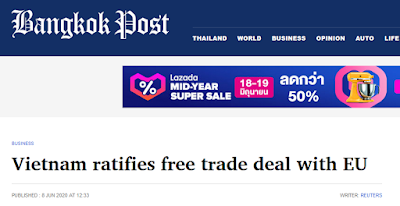Vietnam signs trade deal with Europe
Lawmakers in Vietnam's National Assembly overwhelmingly voted to pass the deal. In a rare move and display of transparency, the vote was broadcast live on Vietnamese television. It is set to boost the country's economy as it looks to maneuver through the corona virus crisis.

The deal, known as the EU-Vietnam Free Trade Agreement (EVFTA), has been in the works since 2012 but was held up for several years due to a series of legal hurdles. Officials signed off on the deal in Hanoi last June and it was ratified by the European Parliament in February this year. The implementation of the deal can't come at a better time for Vietnam when it's on the path of economic recovery after several months of closure due to COVID-19.
The EU will lift 85% of its tariffs on Vietnamese goods and gradually cut the rest of its tariffs over the next seven years. Vietnam will lift 49% of its import duties on EU exports, phasing out the rest over the next 10 years.It will also increase export turnover to the EU by around 20% this year and 44% by 2030. Hanoi also agreed to eliminate all forms of forced labor, to abolish child labor, and to allow workers the right to collective bargaining.
In May, the World Bank said that the trade agreement could help lift hundreds of thousands of people out of poverty in Vietnam. Also boost the country's GDP by 2.4% by 2030. Singapore is the only other Southeast Asian country to sign a free trade agreement with the EU.
Ties between India and EU have hit turbulence in last few years when New Delhi refused to resume negotiations with Brussels to conclude the free trade agreement, officially known as the Broad-based Trade and Investment Agreement (BTIA). The talks for BTIA were launched in 2007.
The Modi government has been insistent on starting fresh talks with the EU. Brussels, on the other hand, wanted India to conclude the talks on the Bilateral Investment Promotion and Protection Agreement (BIPPA) within the BTIA. Commerce and Industry Minister Nirmala Sitharaman, cancelled all investment treaties with EU member countries as New Delhi came out with a new model Bilateral Investment Treaty (BIT) text. But the European Commission had refused to negotiate with India on the new model text.
The Modi government has been insistent on starting fresh talks with the EU. Brussels, on the other hand, wanted India to conclude the talks on the Bilateral Investment Promotion and Protection Agreement (BIPPA) within the BTIA. Commerce and Industry Minister Nirmala Sitharaman, cancelled all investment treaties with EU member countries as New Delhi came out with a new model Bilateral Investment Treaty (BIT) text. But the European Commission had refused to negotiate with India on the new model text.




Comments
Post a Comment